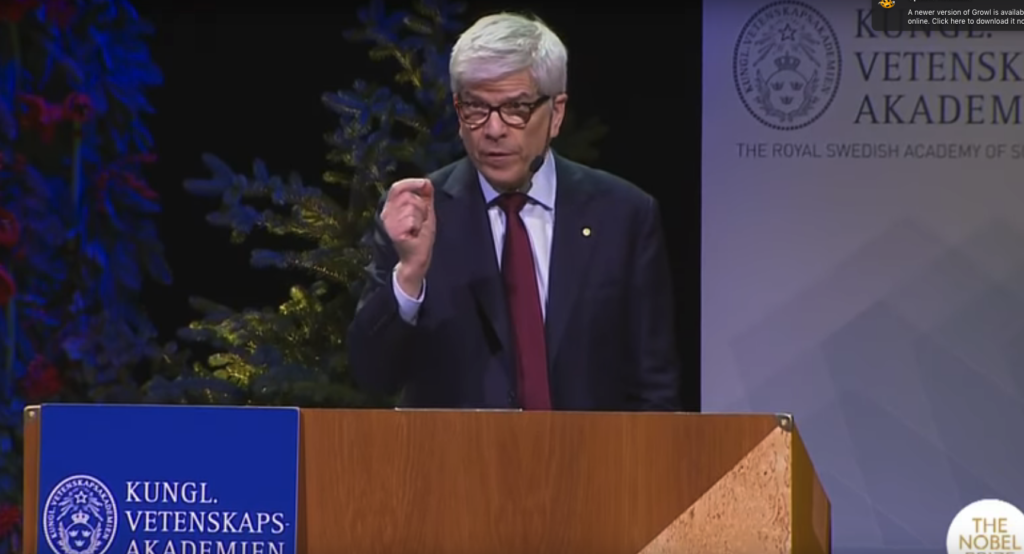Cities are critical to expanding the circle of “us” and generating the new ideas that propel progress
In October, Paul Romer was awarded the Nobel Prize in the Economic Sciences for his work on technology and economic growth. This past weekend, he gave an address in Stockholm, explaining the gist of his work and its implications. While on the surface, the economics of long term growth might seem extremely wonky, Romer gave a lively, accessible and entirely non-technical talk touching on a the nature and sources of well-being and development, the critical importance of inclusion to economic growth and the central role of cities in bettering the world.

A video of Romer’s address is here. It’s just more than a half hour in length, and well-worth the time. Here’s our take on what Romer said, punctuated with excerpts from his remarks.
The core of Romer’s work is the observation that our capacity to generate new ideas is essentially limitless. This stands in contrast to the long dominant view that economic growth hinged on, and was limited by the inherently finite nature of physical resources. This has the dour Malthusian implication–the one that earned economics the nickname “dismal science”–that a growing population inevitably means fewer resources per person.
The Malthusian theory has another implication–not about the trend– but what about what economists refer to as a scale effect. What’s the effect of having more people at a point in time? Suppose you have twice as many people. Here the conclusion is very grim. Twice as many people means half as much copper per person. This is just a arithmetic.
This pessimistic, zero-sum world view is deeply imprinted in our behaviors and social structures. We still think and act much as did our stone age ancestors, viewing outsiders as “others” and a threat to our well-being.
Homo sapiens emerged during the Pleistocene, in an era when this Malthusian theory applied with full force. The elements of human nature were shaped by this experience. I want to emphasize the predisposition we have to group people into us and them. Them is a group that poses an existential threat to us. They might steal our resources and there is also an opportunity we might be able to steal their resources from them. Even if all we do is share, there’s less for us when there’s more of them.
The good news is that ideas, unlike physical stuff, can be shared without limit. Our ability to create new ideas, to extract greater utility out of our fixed quantity of physical resources is the process that powers growth. Ideas, everything from the pythagorean theorem, to the photovoltaic effect, can be infinitely shared and re-used without diminishing their utility to all other users. And because each additional mind turned to the task of figuring out better ways to do things potentially adds to our stock of ideas, a larger population implies not less per person, but more.
Ideas mean that people are no longer our rivals–they can be our allies– and this suggests very important possibility that we can take the set of us and expand it. We can draw bigger circle to include more people inside us, and treat them with the at least indifference or the small appreciation that comes from membership in the set of the set of us.
There’s a third notion of progress, I want to call human progress: progress not in what we have but in who we are. It’s the kind of progress that comes from seeing other people–even perhaps starting to see other sentient beings like the the animals we interact with–seeing them as part of us, treating them with at least indifference rather than malevolence and treating them as objects of predation. This type of progress in who we are is even more important than the material progress.I know that the moral reasoning suggest that we should be capable of that kind of human progress even if in some sense it works to our disadvantage. But, I must be honest: people are people. It’s a lot easier to get people to think of others as allies, if in fact those others actually help them and this is what the period of explosive population growth shows: on balance it’s better to have more people they are our allies, they are part of us.
We live in cities with millions of people most of them are strangers and we’re not threatened by them and we don’t try to attack them. This is something that our ancestors in the Pleistocene could never have understood.Let me just hint at some practical policy applications that emerge from this economics of ideas. One is to think of cities as chances for people–especially in the developing world–to get the benefits of interaction with other people. Other people are beneficial on net and the words of my colleague Ed Glaeser, cities make us smarter.
Our ability to enlarge the circle of “us” is critical to achieving the economies of scale that enable idea creation to make our lives better. Cities that work well bring people together, and create a more inclusive “us.” What Romer’s work underscores is that inclusiveness, and the way in which we build great urban spaces is at the heart of both improving human well-being and assuring that its benefits are widely shared.

